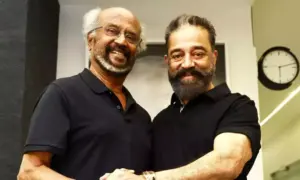
Imagine a film breaking box-office expectations, turning an underdog actor into an overnight sensation. Often, stories of hardship and resilience catch our attention, especially when they come from actors or filmmakers with no industry connections. But is it really sympathy that drives these films to success, or is it the content that resonates with audiences? This question has surfaced often, and lately, with the success of recent releases, it’s sparking a new debate.
The latest film, *Ka*, a suspense thriller starring Kiran Abbavaram, is surprising everyone with its rise to box-office glory. Before *Ka*, Kiran’s career faced a rough patch with a string of flops, paired with relentless trolling on social media. At the pre-release event, Kiran openly shared his emotional journey, from his mother’s hard work as a laborer to his struggles to carve a niche without any backing. This heartfelt moment struck a chord with many, and when *Ka* opened to a fantastic response, some netizens were quick to suggest that the “sympathy factor” had helped elevate the film’s success.
This isn’t the first time sympathy has been linked to a movie’s performance. Earlier this year, *Hanu-Man*, a Sankranti release, faced stiff competition from bigger films and struggled to secure screens. The narrative on social media was filled with claims of a “theater mafia” favoring big-budget films. However, *Hanu-Man* eventually became a blockbuster, with fans hailing it as the underdog that won against all odds. Some credited this success to the public’s sense of injustice, which fueled support for the film.
Similarly, *Kartikeya 2* with Nikhil Siddharth made headlines during its release when the actor spoke out about the challenges of securing theater slots. The debate over small cinema being sidelined was widespread, and the public rallied behind him. The result? *Kartikeya 2* became a surprise pan-India hit, cementing Nikhil’s place in the industry and earning acclaim beyond the Telugu-speaking audience. Once again, many credited the film’s success to a perceived “sympathy wave.”
But is sympathy truly enough to drive a film to blockbuster status? Critics argue that these films owe their success more to solid content than sentiment. Although Nikhil, Teja Sajja, and Kiran Abbavaram—all actors with no film lineage—may draw some extra goodwill for their struggles, it’s their movies’ stories, creativity, and execution that ultimately resonate with audiences. Films like *Hanu-Man* and *Kartikeya 2* performed exceptionally well not only in Telugu regions but across India, which suggests that their success went beyond any sympathy factor, especially with audiences unfamiliar with these actors’ backgrounds.
In reality, audiences today are savvier and demand quality. The sympathy card may create initial buzz, but only the content can carry a film forward. The success of *Ka*, *Hanu-Man*, and *Kartikeya 2* likely stems from more than just sympathy; they tell stories that engage, entertain, and, most importantly, connect. While sympathy may bring attention to a film, it’s the substance within that builds its legacy.
True success in cinema lies in the ability to tell a story that moves people, one that doesn’t rely on public sentiment but stands on its own merit. These films remind us that the heart of cinema isn’t just about supporting the underdog but about celebrating stories that truly touch audiences. For, in the end, content remains king.
Recent Random Post:
















